Premium Only Content
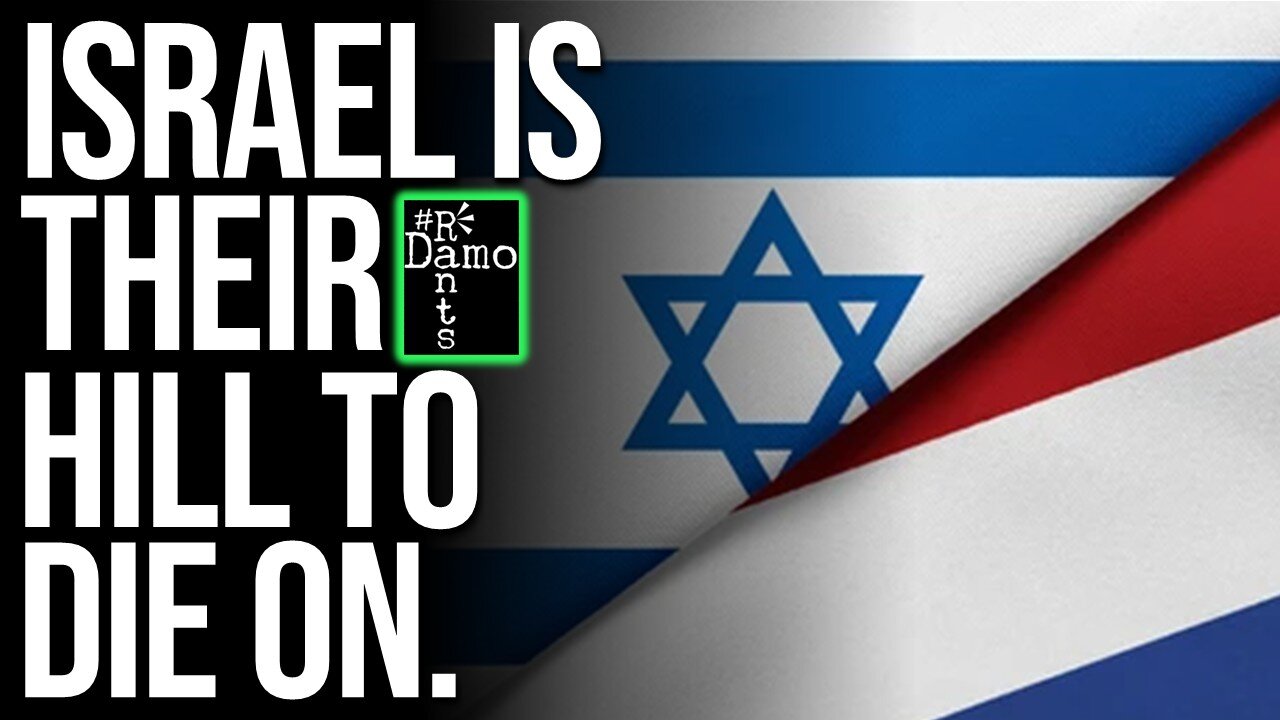
Netherlands Refuses Sanctions on Israel — And Ministers Quit in Revolt
Right, so despite moves to censure Israel, the declaration of Israel as a national security threat and the joint venture with Sweden to see the EU-Israel Trade Agreement suspended, the Dutch government was already on borrowed time, having effectively collapsed a couple months ago, so the acceleration of that we’re seeing now with the departure of another coalition party, ostensibly because the Dutch government won’t impose sanctions on Israel is actually the latter half of a bigger story.
Dutch politics had already reached a moment of profound instability, that unstable government, already due to end come October with snap elections, deciding to lose another party rather than take an anti israel stance, it all makes for a nation that has had such positive headlines in taking Israel to task still having a government that has chosen Israel as their hill to die on, fatally wounded as they were already anyway. The cabinet led by Prime Minister Dick Schoof was already faltering when Geert Wilders’ Party for Freedom (PVV) withdrew from government back in June, shattering what had been a fragile coalition. Yet the asylum dispute that precipitated Wilders’ departure, the Dutch answer to Nigel Farage as he is, was only the beginning. What ultimately pushed the government into a deeper crisis was not migration but foreign policy, specifically its refusal to sanction Israel as famine spread in Gaza and international courts investigated charges of genocide.
The resignation of Foreign Minister Caspar Veldkamp on 22 August, and the withdrawal of the entire New Social Contract party following in his wake, marked the decisive rupture. Although the government was already functioning in a caretaker capacity after Wilders’ exit, this new wave of resignations stripped it of any moral or political legitimacy. The Netherlands now moves toward thsee October elections under the leadership of a two-party rump cabinet, reduced to paralysis and it’s entirely of their own doing.
Right, so the origins of the present crisis lie in the formation of the Schoof cabinet after the 2023 general election. Schoof, a career civil servant and intelligence official, was selected as a compromise prime minister because he was seen as a neutral technocrat who could command respect across the political spectrum. Yeah, you called that one wrong didn’t you? Yet the coalition he was asked to lead was structurally contradictory from the outset.
On one side stood Geert Wilders and the PVV. Having emerged as the largest single party in the election, Wilders claimed the right to shape government policy. His entire political career has been built on anti-Muslim rhetoric and his framing of Israel as a frontline state in the civilisational struggle between “the West” and Islam. For Wilders, Israel was not merely a foreign ally but a symbolic extension of his domestic agenda. His party demanded unconditional support for Israel, rejecting any criticism of its military actions in Gaza.
On another side were the VVD and the BBB, representing the mainstream right and agrarian populism respectively. These parties did not share Wilders’ ideological zeal for Israel but were equally reluctant to act against it. Prime Minister Schoof, hailing from the VVD, articulated a position that the Netherlands would not act unilaterally but would only move within the framework of European Union consensus. So that’ll be not moving much at all then. Because EU foreign policy requires unanimity, and because member states such as Germany, Austria, and Hungary consistently blocked sanctions on Israel, this amounted to a policy of permanent inaction. By insisting on waiting for Brussels, Schoof ensured that no action would ever be taken, effectively keeping Wilders onside in that respect.
The third side of the coalition triangle was the NSC, the party created by Pieter Omtzigt after the childcare benefits scandal. NSC was born with a reformist and moralistic ethos, committed to transparency, integrity, and the rule of law. In relation to Gaza, it positioned itself as the conscience of the coalition, calling for stronger measures against Israel and at least the consideration of sanctions. Its foreign minister, Caspar Veldkamp, embodied this approach.
What united these three forces was only the arithmetic of power. Without PVV, a coalition would lack democratic legitimacy, they were the largest party despite being the far right. Without VVD and BBB, it would lack institutional stability. Without NSC, it would lack a reformist face. Yet in terms of substance, they were utterly irreconcilable. On Israel, one side demanded unconditional support, another side demanded accountability, and a third side chose paralysis. As long as Israel’s war on Gaza remained background noise, this impossible triangle could function. But once famine, genocide charges, and global outrage came to the forefront, the contradictions became unmanageable.
This was the coalition’s original sin: an attempt to reconcile the irreconcilable, at a time when Israel and Gaza were guaranteed to dominate global politics. The very structure of the cabinet contained the seeds of its own destruction.
The first rupture in the Schoof cabinet occurred back in June of this year. The immediate issue was not Israel but asylum policy. Wilders, frustrated that his demands for sweeping restrictions on immigration had not been met, pulled the PVV out of the coalition on 3 June. This move collapsed the government in formal terms, turning it into what they call a demissionary caretaker cabinet. King Willem-Alexander even cut short a state visit to address this crisis at home. Snap elections were called for 29 October.
The June collapse exposed two critical truths. First, Wilders was never a reliable partner. His political strategy has always been to maximise disruption, not to sustain compromise. Second, the Schoof cabinet was already reduced to a weakened form long before Israel became the breaking point. By June, the government was operating on borrowed time, without a majority, and in the knowledge that elections were only months away.
What was not yet clear in June was that Israel would soon provide the second and fatal rupture. The asylum dispute showed the coalition could not reconcile its domestic agendas, Wilders the Islamophobe could not be pacified. Gaza would show it could not reconcile its foreign policy either.
At the same time though, Gaza had become impossible to ignore nonetheless. International bodies had declared famine. The International Court of Justice and the International Criminal Court were investigating allegations of genocide. The humanitarian situation was broadcast daily across global media. In this context, the Dutch government’s refusal to sanction Israel, even as the government was being forced to wind up ahead of October elections became untenable. Schoof had nothing to sit on the fence over anymore. Wilders was gone, he could have done the right thing, but chose not to, clearly its not his own position either.
Public opinion was already clear though. In April, an Ipsos I&O survey revealed that support for the cabinet’s Israel policy was falling. In May, an RTL poll found that two-thirds of Dutch respondents believed Israel’s bombing of Gaza was “out of all proportion,” and 77 percent condemned its blockade of humanitarian aid. An earlier poll from October of last year had shown that 55 percent of the Dutch public wanted their government to be more critical of Israel, with only 6 percent wanting it to be more supportive. These figures pointed to a broad consensus in Dutch society that Israel’s actions were unacceptable and that the Netherlands should take a stronger stance.
Yet Schoof still refused. His line was consistent but hollow: the Netherlands would not act alone, even though the EU couldn’t act at all and he knew this. Sanctions, if they were to be imposed, would have to be decided at the EU level and he knew they would never come, they would be vetoed by the likes of Austria or Germany or Hungary. This was not pragmatism but paralysis. EU unanimity rules on foreign policy meant sanctions were a political impossibility. By hiding behind Brussels though, Schoof was committing the Netherlands to permanent inaction.
For NSC, this was indefensible. Caspar Veldkamp, as foreign minister, had pressed for sanctions. When he was blocked, he chose to resign on 22 August. His resignation letter made clear that he could not remain in a government that refused to act while famine raged in Gaza. His departure was soon followed by the withdrawal of all NSC ministers and state secretaries. The party declared that it would not be complicit in a government that refused to sanction Israel in the face of genocide.
This was the second collapse of the Schoof cabinet in three months therefore. The first, in June, had been caused by Wilders leaving. The second, in August, was caused by NSC’s refusal to remain silent over Gaza. The government was reduced to a rump of VVD and BBB, a caretaker in name but a hollowed-out entity in practice, limping on now until October 29.
The opposition have as a result seized the moment. Kati Piri of GroenLinks-PvdA described the government’s refusal to sanction Israel as “shameful.” European media portrayed the Netherlands as a country paralysed by contradictions. Reports followed that the Israel sanctions debate had deepened political turmoil in The Hague. What was left was a government existing only in form. It had no capacity to act, no credibility at home, and no moral standing abroad.
The Netherlands has long prided itself on pragmatic consensus politics, on the ability to govern through compromise. But Gaza revealed that some issues cannot be fudged. On famine and genocide, pragmatism became indistinguishable from complicity.
The consequences of the August resignations are far-reaching therefore. For NSC, the decision to walk out was an attempt at redemption. Having tarnished their reputation by entering government with Wilders in the first place of all people, they now tried to reclaim the mantle of integrity by resigning on principle and given its Israel, it’s a tough shout to criticise them for that. Veldkamp declared that he could not be complicit in silence. Whether voters will reward this stand remains to be seen, but it gave NSC a narrative to take into the October campaign.
For Schoof and the VVD, the damage was severe. Their fence-sitting had been exposed as cowardice. By hiding behind EU unanimity, they had committed the Netherlands to paralysis, even as public opinion demanded action. The government’s stance satisfied no one. It alienated pro-Israel ideologues who wanted vocal support, and it alienated reformists who wanted sanctions. The result was weakness on all fronts. Abstention pleases nobody.
For Wilders, the collapse was an opportunity. Having left in June, the PVV bore no responsibility for the paralysis of August. Wilders could posture as a defender of Israel and a critic of Schoof’s incompetence. Polling suggested that his party remains the strongest single force heading into October, despite his avowed support for Israel.
For GroenLinks-PvdA, an Alliance between the Dutch Green Party and Labour Party as that effectively is, the crisis was a gift. Their platform was rooted in human rights, and public opinion was with them. They positioned themselves as the only credible alternative, condemning the government’s inaction as complicity in genocide. Having united their forces earlier in the year, they now had a clear issue to campaign on.
The broader significance of these events is that Israel and Gaza have done far more damage to Dutch politics than initially apparent. What appeared to be a foreign policy dispute turned into a structural crisis of governance.
The first dimension of this damage is structural. Israel became a coalition-breaker for another state. It was impossible to reconcile PVV’s unconditional support, VVD’s permanent inaction, and NSC’s demand for accountability. No coalition can function when its members hold diametrically opposed positions on an issue as grave as famine and genocide.
The second dimension is moral. Dutch politics has long prided itself on pragmatism. But Gaza exposed the limits of this tradition. Pragmatism cannot mean permanent complicity. A government that refuses to act in the face of famine is not pragmatic; it is morally bankrupt.
The third dimension is identity. Wilders used Israel as a proxy for his domestic anti-Muslim politics. Gaza became not just a foreign policy issue but a symbol of identity politics within the Netherlands. For NSC, Israel was a test of integrity. For VVD, it was an excuse for inaction. Israel thus reshaped Dutch politics from within, creating divisions that could not be bridged.
As the Netherlands approaches those October elections, the legacy of these events is clear. The election will not be fought only on asylum policy or on technocratic competence. It will actually be a referendum on Israel and Gaza.
If PVV emerges dominant, those polls on Israel and Gaza in the Netherlands would I think in that event have observers asking what are you thinking? Israel will have a vocal defender in Dutch politics. If GroenLinks-PvdA gains strength, the Netherlands may pivot toward sanctions and accountability. If VVD tries to hold the centre, it will struggle to explain why it chose inaction while famine unfolded. If NSC survives, it will be because voters believe that resigning in August was a principled act, not a belated attempt to save face.
The coalition arithmetic is now harder than ever though. The irreconcilable positions on Israel mean that the old majority formulas no longer work. Any future government will have to take a clearer stance on Israel, one way or the other.
The collapse of the Schoof cabinet illustrates how the refusal to sanction Israel has torn through Dutch politics and it’s a lessons for other nations too who are sitting on their hands in defiance of the will of the people. What began as an “impossible triangle” of ideologies — Wilders’ devoutly pro-Israel racism, Schoof’s hollow pragmatism, and the NSC’s reformist conscience — was destined to implode once Gaza became the defining moral crisis of Europe. In June, Wilders walked away. In August, Caspar Veldkamp and the NSC could no longer stomach complicity and resigned. What remains is a ghost government, staggering on paper but dead in spirit, limping toward October.
The lesson is a brutal one. Pragmatism in the face of famine and genocide is not neutrality. It is moral abdication. It is complicity dressed up as caution. By refusing to sanction Israel, Dick Schoof chose paralysis — and in doing so, he detonated the very stability he claimed to defend.
Yet the reckoning is not finished. The October election will decide whether the Netherlands cements its reputation as a state willing to look away from war crimes, or whether it finally breaks with complicity and confronts Israel’s actions head-on. Schoof’s government may already be dead, but the larger question remains unresolved: will Dutch democracy redeem itself, or will history remember this moment as the time the Netherlands chose silence in the face of genocide, even as they try to take action?
In light of all of this, it’s a wonder the Netherlands ever managed to get it voted through that Israel was now officially a national security threat in the Netherlands, yet a threat it very much is, a win for the NSC and Caspar Veldkamp as that was, so get all the details of that story in this video recommendation here as your suggested next watch.
Please do also hit like, share and subscribe if you haven’t done so already so as to ensure you don’t miss out on all new daily content as well as spreading the word and helping to support the channel at the same time which is very much appreciated, holding power to account for ordinary working class people and I will hopefully catch you on the next vid. Cheers folks.
-
 LIVE
LIVE
Major League Fishing
1 day agoLIVE! MLF Toyota Series Championship!
195 watching -
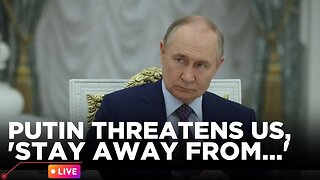 LIVE
LIVE
Times Now World
5 days agoVladimir Putin LIVE | Putin rushes to help Maduro, sends Wagner Group | US-Venezuela News | Trump
290 watching -
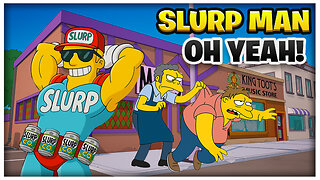 LIVE
LIVE
DynastyXL
2 hours ago🔴LIVE Slurp Man when? Lets PLAY with viewers
403 watching -
 1:12:46
1:12:46
Dialogue works
7 hours ago $0.12 earnedLarry C. Johnson & Col. Larry Wilkerson: Russia & Iran to Build a WAR SHIELD — China Just Stepped In
2951 -
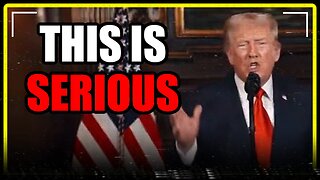 9:03
9:03
MattMorseTV
17 hours ago $52.46 earnedTrump’s America First CALL TO ACTION.
61.6K96 -
 2:18:38
2:18:38
Side Scrollers Podcast
21 hours agoGTA 6 GETS WRECKED AFTER ANOTHER DELAY + India THREATENS YouTuber Over Video + More | Side Scrollers
130K16 -
 18:03
18:03
Nikko Ortiz
1 day agoEBT Meltdowns Are Insane...
18.6K44 -
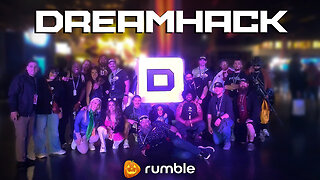 17:33
17:33
a12cat34dog
23 hours agoRUMBLE TAKEOVER @ DREAMHACK | VLOG | {HALLOWEEN 2025}
51.3K25 -
 10:48
10:48
GritsGG
17 hours agoWarzone Stadium Easter Egg! Unlock Grau Blueprint EASY!
23.9K2 -
 LIVE
LIVE
Lofi Girl
3 years agolofi hip hop radio 📚 - beats to relax/study to
522 watching